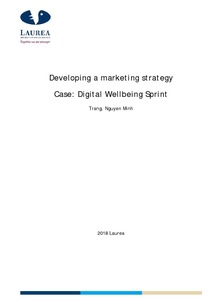Developing a marketing strategy : case: Digital Wellbeing Sprint
Nguyen Minh, Trang (2018)
Nguyen Minh, Trang
Laurea-ammattikorkeakoulu
2018
All rights reserved
Julkaisun pysyvä osoite on
https://urn.fi/URN:NBN:fi:amk-201805076745
https://urn.fi/URN:NBN:fi:amk-201805076745
Tiivistelmä
The subject for this study was initiated when the author worked as the trainee for international office at Laurea University of Applied Sciences and had a role as volunteered organizer of the free-time activities for Digital Wellbeing Sprint 2017. Digital Wellbeing Sprint is a summer school program organized by an alliance of three Universities of Applied Sciences since 2016 with the main idea of providing an intensive course for multidisciplinary groups of students from each university and their partner institutions.
The purpose of this thesis is to develop a marketing strategy for Digital Wellbeing Sprint based on researches conducted mainly on the current and potential participants. Accordingly, author suggests suitable service improvements tactics for organizers of Digital Wellbeing Sprint in the next following years with the purpose of delivering the best service experiences to students and attracting more international students from abroad.
This knowledge background of this thesis concentrates on marketing concepts and developing a marketing strategy based on the service marketing mix as the theoretical background. The explosion of the digital era has changed the method of conducting marketing researches and approaching potential customers. This study was carried out by both qualitative and quantitative method in form of two surveys and one interview with organizer to discover the best practices for effective customer acquisition.
Then, the current situation and result from current and potential participants are presented in the empirical research part. The main challenges that organizers of the Digital Wellbeing Sprint faced were the poor amount of participants and the fact that the project has been organized for only two years so that it was a “learning by developing” process for the organizers. Accordingly, based on the findings from empirical research, suggestions on marketing and communication channels were proposed by authors and best practices regarding the social programme, price, practicalities are presented as the main outcome of the study to enhance the quality of the project. In addition, for further research, Laurea University of Applied Science is suggested to organize the summer school program itself as a marketing channel to promote student mobility and partnership with its institution.
The purpose of this thesis is to develop a marketing strategy for Digital Wellbeing Sprint based on researches conducted mainly on the current and potential participants. Accordingly, author suggests suitable service improvements tactics for organizers of Digital Wellbeing Sprint in the next following years with the purpose of delivering the best service experiences to students and attracting more international students from abroad.
This knowledge background of this thesis concentrates on marketing concepts and developing a marketing strategy based on the service marketing mix as the theoretical background. The explosion of the digital era has changed the method of conducting marketing researches and approaching potential customers. This study was carried out by both qualitative and quantitative method in form of two surveys and one interview with organizer to discover the best practices for effective customer acquisition.
Then, the current situation and result from current and potential participants are presented in the empirical research part. The main challenges that organizers of the Digital Wellbeing Sprint faced were the poor amount of participants and the fact that the project has been organized for only two years so that it was a “learning by developing” process for the organizers. Accordingly, based on the findings from empirical research, suggestions on marketing and communication channels were proposed by authors and best practices regarding the social programme, price, practicalities are presented as the main outcome of the study to enhance the quality of the project. In addition, for further research, Laurea University of Applied Science is suggested to organize the summer school program itself as a marketing channel to promote student mobility and partnership with its institution.
